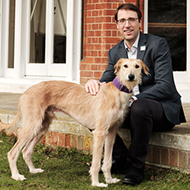
Mr Laurie aims to lead renowned charity out of lockdown.
Animal welfare charity Battersea has announced that Peter Laurie will take over as its new chief executive, following the departure of Claire Horton CBE from the charity.
“Peter is well-known and respected in the animal welfare sector,” said Battersea chairman, Paul Baldwin. “During his six years at Battersea, he has led the development of Battersea’s work to support animal rescue organisations across the UK and worldwide.
"He played a leading role last year in working with sector colleagues and Government to provide a framework for animal rescue and rehoming organisations to continue operating during the pandemic.
“Battersea is a dynamic, thriving, and ambitious charity that is already making great strides as a force for change, and I very much look forward to working with Peter to fulfil our ambitious plans.”
Mr Laurie joined Battersea in February 2015 as director of operations. He became deputy chief executive in March 2017 and has held the position of interim chief executive since January.
His appointment comes at a time when Battersea's services are in increasingly high demand. The COVID-19 pandemic has had a significant impact on rescue centres, pet owners and animals alike, and a rise in demand for pets has caused a sharp increase in puppies and kittens being smuggled or imported into the UK.
Commenting on his appointment, Mr Laurie said: “I feel very honoured and excited to be asked to lead Battersea. It’s a charity I am deeply committed to and a cause I am truly passionate about. As we emerge from the COVID-19 pandemic, our staff, volunteers and supporters are as determined now as at any time in our history to be here for every dog and cat that needs us.
“We look forward to harnessing new opportunities and working in partnership with colleagues across the UK and around the world to create brighter futures for these wonderful animals”.
Image (c) Battersea.



 The Veterinary Medicines Directorate (VMD) is inviting applications from veterinary students to attend a one-week extramural studies (EMS) placement in July 2026.
The Veterinary Medicines Directorate (VMD) is inviting applications from veterinary students to attend a one-week extramural studies (EMS) placement in July 2026.